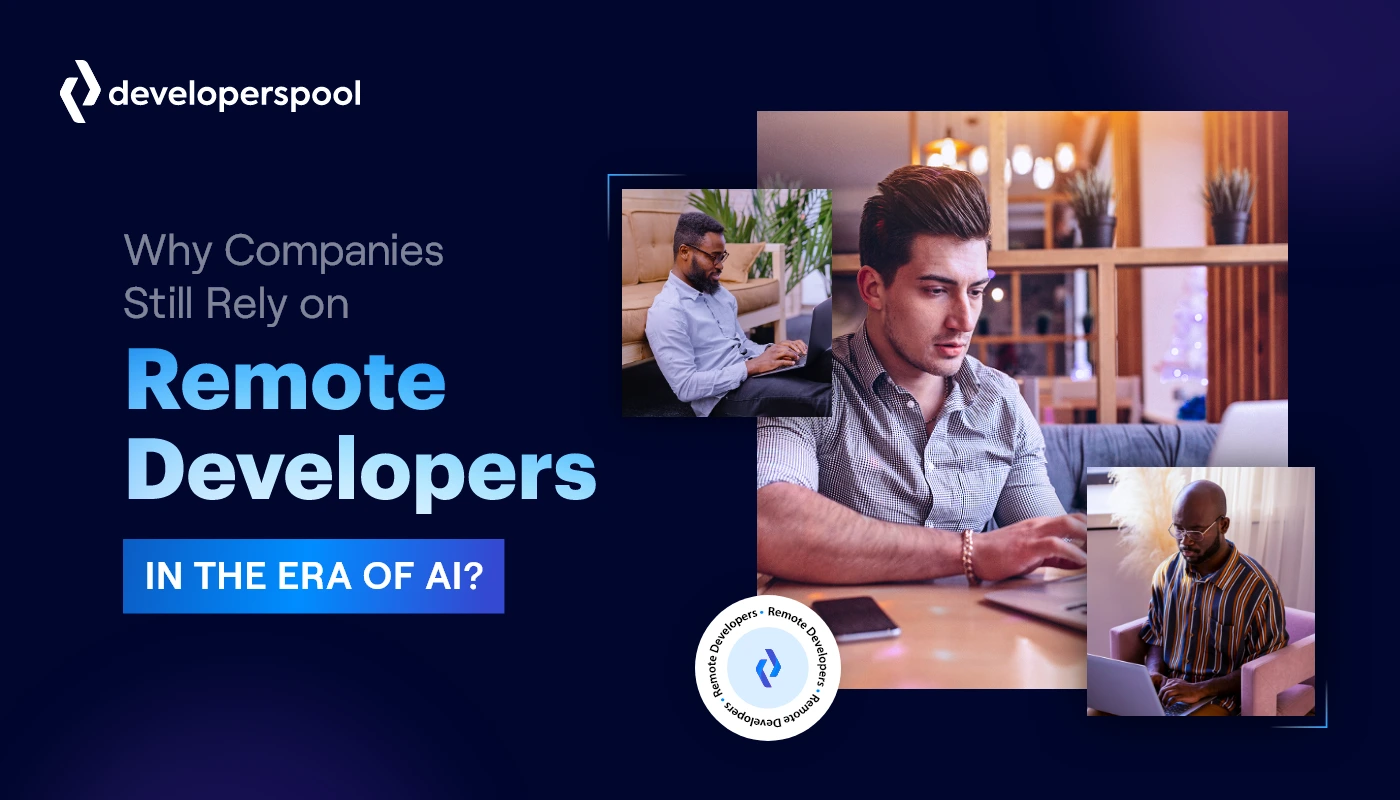Why Dev Teams Are Growing Despite AI – Real-World Hiring Trends
- August 29, 2025
- 9 mins
- 8.1k

AI has changed practically every industry ranging from healthcare to finance and software development is no exception as well. With the rise of AI in software development, many predicted that traditional developer roles would shrink. After all, if AI could generate code, test applications & automate tasks why would companies continue hiring large teams of developers?
But here is the surprising reality – developer teams are not shrinking-they’re growing.
In this article, we’ll explore why this counterintuitive trend is happening, unpack the latest IT staffing trends & look at how roles like full stack developer hiring, remote developer hiring & AI software developer positions are expanding instead of disappearing.
The Myth – AI Replacing Developers
The narrative often goes like this – AI coding assistants like GitHub Copilot or ChatGPT can write code, fix bugs & even optimize systems.
Which means businesses will need less developers, right?
But the truth is more complex than that. Even though AI can automate repetitive or low-level coding tasks but it does not replace the creativity, problem-solving & architectural thinking that modern applications demand. Apart from this, a lot of CTOs are looking at AI as an augmentation tool – something that enhances developer productivity than replacing the need for talent.
AI can: –
- Suggest snippets of code.
- Automate testing and debugging.
- Streamline documentation.
But it cannot fully handle system architecture, stakeholder communication, product design or real-world problem-solving that developers bring to the table.
The Reality – Development Teams Are Expanding
Despite advancements in AI, businesses are hiring more developers than ever. Here’s why.
-
Demand for Custom Solutions is Growing
Companies increasingly need custom AI application development and digital solutions tailored to their industry. Off-the-shelf tools aren’t enough. Enterprises want personalized apps, integrations & platforms that align with unique workflows, compliance requirements & customer experiences.
This means full stack developer hiring continues to rise, as businesses need talent who can bridge frontend, backend & AI-driven components.
-
AI Creates New Job Categories
Instead of replacing developers, AI is creating new specialized roles. Companies now hire: –
- AI software developers who understand machine learning, natural language processing & model integration.
- Prompt engineers who fine-tune AI models for specific use cases.
- MLOps engineers to manage the deployment and lifecycle of AI applications.
This diversification means organizations are adding more seats, not cutting them.
-
Businesses Need Faster Delivery
In today’s digital economy, speed is everything. From start-ups to Fortune 500s, companies want to roll out products quickly to stay ahead. While AI can speed up coding, teams still need more developers to meet ambitious release timelines, manage parallel projects & maintain existing platforms.
This directly fuels growth in remote developer hiring, where businesses tap into global talent pools to scale quickly.
IT Staffing Trends Shaping 2025
Let’s zoom out and look at the broader IT staffing trends driving this growth.
Hybrid Teams Are the New Normal
Gone are the days when development teams were fully in-office. The rise of remote developers has reshaped hiring strategies. Businesses are building hybrid teams-some on-site for collaboration, others remote for flexibility and scalability.
This shift not only reduces costs but also allows companies to access top talent globally, fueling remote developer hiring as a long-term staffing strategy.
Full Stack Developers Remain in High Demand
Despite AI tools, companies still want developers who can “do it all.” Full stack developer hiring continues to grow because organizations value talent who understand both user-facing design and backend logic.
Even in AI-driven projects, these developers act as integrators-making sure AI components work seamlessly with applications, APIs & databases.
AI Expertise is Becoming a Standard Requirement
Job descriptions are evolving. Where once “JavaScript and Python” were enough, today many roles include expectations like: –
- Familiarity with AI in software development tools.
- Ability to integrate APIs with AI-powered platforms.
- Experience training or fine-tuning AI models.
This shows a new trend: – even traditional developers are expected to have AI software developer skills.
Remote Developer Hiring – The Growth Engine
The pandemic accelerated remote work adoption, but the momentum hasn’t stopped. In fact, remote developer hiring has become a permanent fixture in IT staffing.
Here’s why businesses are doubling down on remote teams: –
Access to Global Talent: – Companies are no longer limited to local hire. They can afford to recruit knowledgeable programmers from the Indian Subcontinent, Eastern Europe or Latin America at competitive prices.
Scalability on Demand: – Need 10 devs for a new project? Staffing remotely eliminates long on-boarding cycles, allowing for rapid scaling.
Round-the-Clock Productivity: – Having developers in different regions provides the prospect of 24/7 development cycles, which works wonders for any start-up that is pressed for time.
In short, remote developers are no longer a “backup plan.” They’re central to IT growth strategies.
Why Companies Still Rely on Human Developers
If AI is so powerful, why do companies still rely heavily on human developers?
Contextual Understanding
Developers understand the business logic, user context & cultural nuances that AI lacks. For example, designing a fintech app for GCC markets requires not just code but an understanding of regional compliance laws & customer expectations.
Collaboration and Creativity
Building products is not just about writing code. Developers collaborate with product managers, designers’ marketers & stakeholders to shape experiences AI cannot anticipate.
Accountability and Ownership
When an AI system fails or produces biased results, companies need humans to take responsibility. This accountability makes developers indispensable in the loop.
The Rise of the AI-Enhanced Developer
We’re entering an era where every developer is becoming an AI software developer-not by replacing their core skills, but by enhancing them with AI tools.
Examples include: –
- Using AI to generate boilerplate code while focusing on high-level architecture.
- Leveraging AI-powered analytics to optimize system performance.
- Automating bug fixes while spending more time on innovation.
This hybrid model-human creativity plus AI efficiency-is why developer teams are expanding, not shrinking.
Case Studies – Real-World Hiring Trends
-
A FinTech Start-up in London
This company adopted AI to automate transaction categorization. But instead of reducing headcount, they hired remote developers to build custom integrations, improve UX & scale compliance checks. Their team grew by 30% in one year.
-
A Healthcare SaaS Provider in the US
AI helped streamline clinical data processing. Yet, the provider needed full stack developer hiring to ensure smooth integration between AI models, patient apps & backend systems. The company doubled its developer team while adopting AI.
-
A Global Retail Brand in the GCC
After introducing AI-powered recommendation engines, the retailer expanded its tech team to include AI software developers and cloud engineers. Why? Because AI required human oversight, testing & continuous optimization.
Looking Ahead – What This Means for IT Leaders
For CTOs & CIOs, the takeaway is clear – AI is not reducing your need for developers. Instead, it’s reshaping the type of developers you need.
Key action points: –
- Train your existing team with AI so they can work alongside AI effectively.
- Increase remote developer hiring strategies to stay competitive in retrieving global talent.
- Balance full stack developer hiring with AI-specialized roles to build agile, future-proof teams.
In Summary
The conversation around AI often drifts into extremes-either utopian automation or mass job losses. But the real-world story is different.
AI in software development is powerful, but it’s not replacing developers. Instead, it’s elevating them-allowing teams to move faster, build smarter & create solutions that AI alone could never achieve.
That’s why IT staffing trends point in one direction – developer teams are growing, not shrinking. The future of tech belongs to hybrid teams-human developers empowered by AI.
Frequently Asked Questions
No. AI can only speed up tasks like writing code or testing, but it cannot replace human creativity, problem-solving & decision-making. Developers are still needed to design systems, understand business needs & build real solutions.
Full stack developers can handle both the frontend and backend of applications. Even with AI tools, businesses need experts who can connect everything together and ensure apps run smoothly.
Companies want to access global talent, cut costs & scale projects faster. Remote developers make it easier to build strong teams without location limits.
AI software developers usually know machine learning, data processing, and tools like Python, TensorFlow or NLP libraries. They also need coding and system integration skills to connect AI with real products.
AI is creating new roles instead of removing jobs. Companies now look for developers who can use AI tools, build custom solutions & work in hybrid or remote teams.
Recent Blogs
Stay ahead with the latest tech trends with our informative blogs and
insider guide to hire the best talent.






